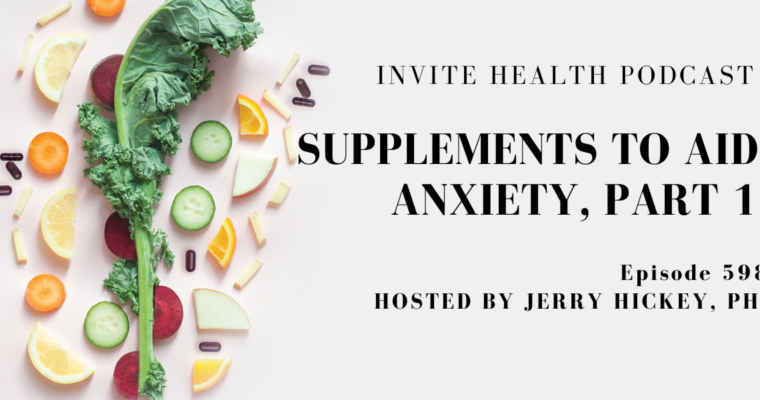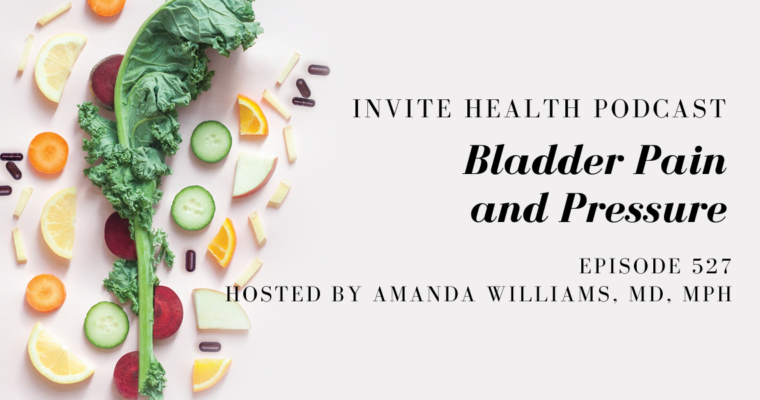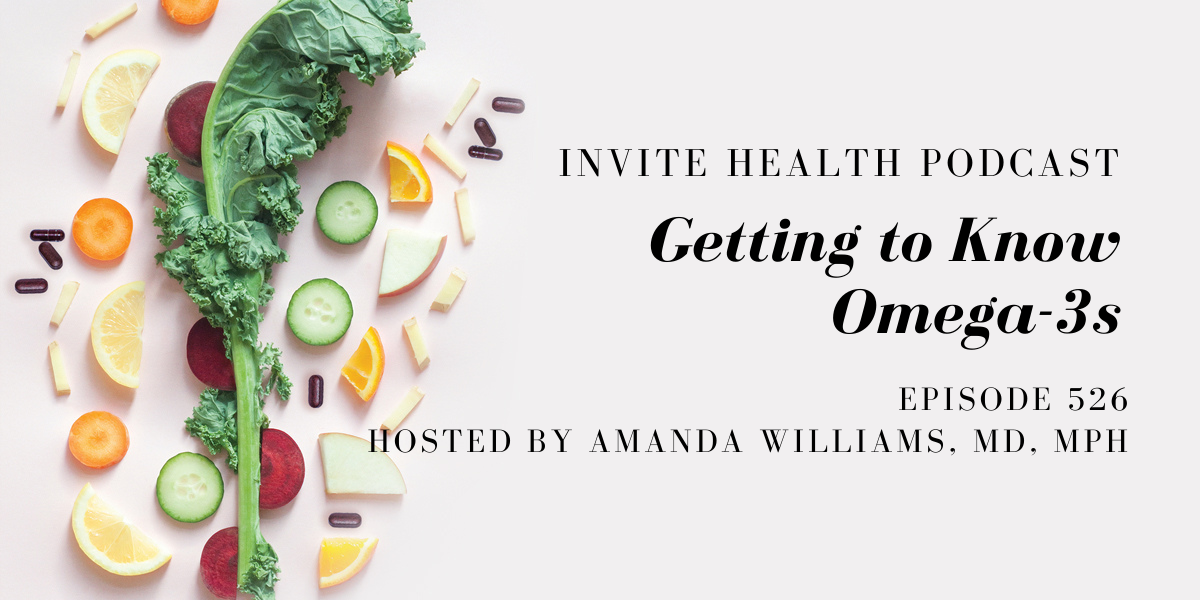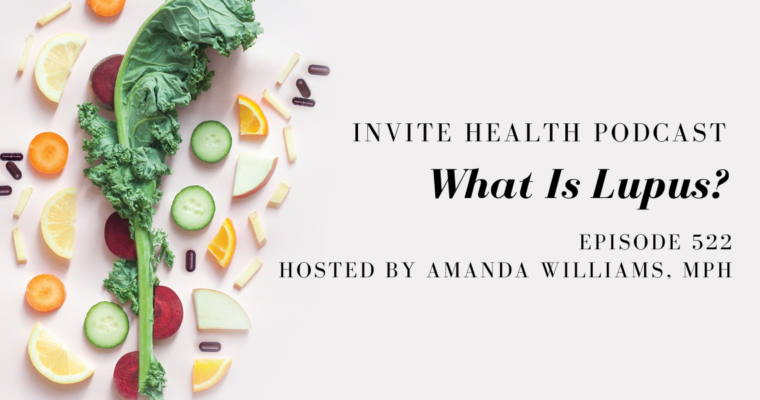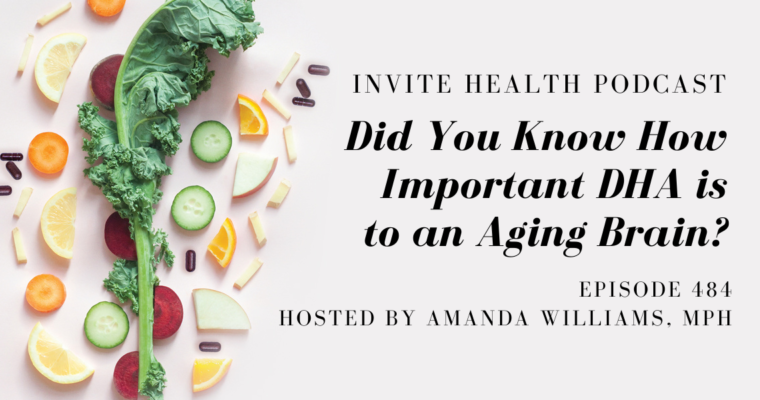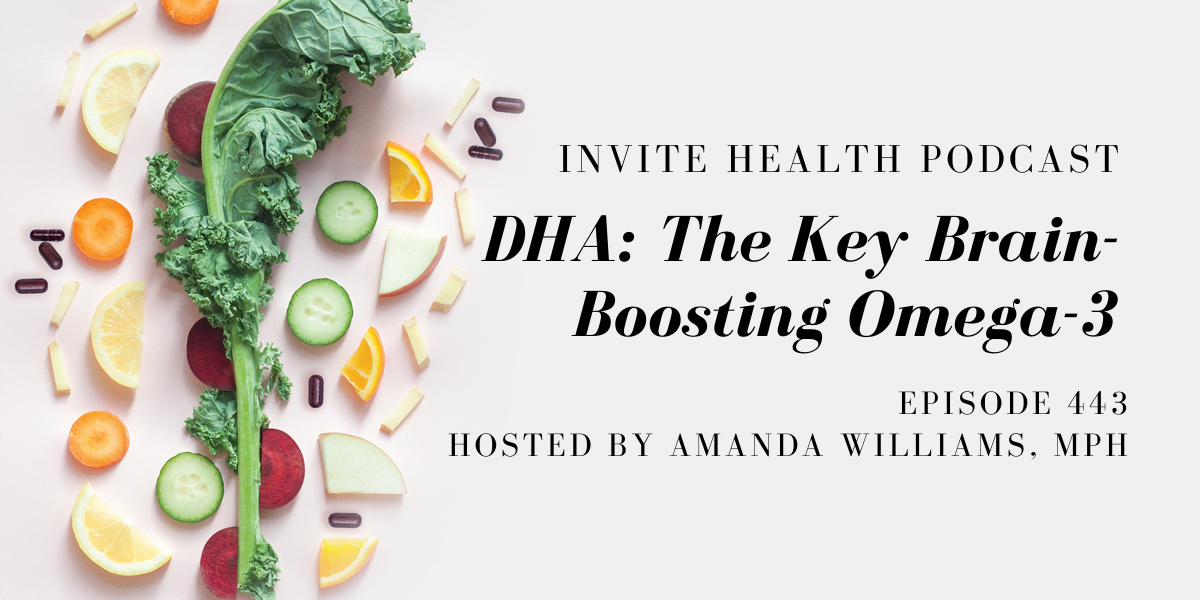omega-3s
Subscribe Today!
Please see below for a complete transcript of this episode.
Getting to Know Omega-3s – InViteⓇ Health Podcast, Episode 526
Hosted by Amanda Williams, MPH
*Intro music*
InViteⓇ Health Podcast Intro: Welcome to the InViteⓇ Health Podcast, where our degreed healthcare professionals are excited to offer you the most important health and wellness information you need to make informed choices about your health. You can learn more about the products discussed in each of these episodes and all that InViteⓇ Health has to offer at www.invitehealth.com/podcast. First time customers can use promo code PODCAST at checkout for an additional 15% off your first purchase. Let’s get started!
*Intro music*
Amanda Williams, MPH:
[00:00:40] You’ve probably heard by now that omega-3 fatty acids are pretty important in the body, and indeed they are. They’re actually essential. We have to have them in order for our bodies to function properly. We also know that when it comes to our dietary intake of omega-3s, most Americans are certainly lacking in that and this can create problems. So today I want to talk about omega-3 fatty acids, where we saw some problem and some reasons other than diet that could be creating low omega-3s in your system.† [00:01:14]
[00:01:15] So let’s talk a little bit about the importance of these essential fatty acids. We understand that we have to have these in our body in order to have good health just for things to function, right? And when you think about omega-3s, many times people think about heart health and cholesterol. And of course, they definitely play a role into this when it comes to the rhythm of the heart. So when you think about arrhythmias, for example, if the heart is misfiring, oftentimes we can look at low omega intake as being a causative reason for this, not only for the electrical conduction pattern of the heart, but also for the inflammation. And we know that omega-3s help to lower inflammation in the body. We know that it helps to keep our blood vessels more protected from any type of a plaque buildup. We certainly can see how omega-3s work to convert nutrients from food into usable forms of energy for us. We definitely now understand the full impact of these important fatty acids when it comes to the health of our brain, our immune system from the time that we’re born. Our bodies are heavily reliant in terms of keeping us healthy and our immunity strong because of omega-3 fatty acids. So it’s definitely much more than just the support of healthy cholesterol.† [00:02:40]
ALL ABOUT ARRHYTHMIAS – INVITE HEALTH PODCAST, EPISODE 434. Listen Now>>
[00:02:42] When it comes to food sources, many Americans just fall way short. It’s not just coming from fatty fish. We also recognize that things like walnuts and flaxseeds, for example, would be excellent choices for a plant-based omega-3. They actually just did a research study over at Penn State University, and they showed that ALA, this is the specific omega-3 that is found in those plant-based foods like walnuts and flaxseed, actually was associated with a 10% lowered risk of cardiovascular disease, which is really quite profound. That just incorporating these foods into your diet as part of a diet that was rich in healthy fruits and vegetables and these wonderful healthy fats coming from those seeds and nuts, actually helped to improve upon your cardiovascular health and lower the risk of a major cardiovascular event.† [00:03:42]

[00:03:42] So that in and of itself should tell you, “Yeah, maybe I should be taking in some more omega-3s in my diet, as well as supplementation.” Because remember, even if you’re eating walnuts and flaxseeds and salmon, for example, there’s other reasons as to why you could potentially have low omega-3 status in the body. Maybe you partake too much in the consumption of alcohol. Perhaps it’s just the way that your body has an inability to properly absorb fatty acids. It could be that you have a high intake of sugar. We definitely know that stress can lower your omega-3 stores. There are many different things that can offset your omega status, and definitely, we know that the high intake of omega-6 fatty acids will lead to lowered omega-3s.† [00:04:39]
[00:04:41] So all of these things are certainly important when you think about your overall health and wellness, because when you understand that omega-3 deficiency in the body can be linked to so many different conditions and the symptoms that people present with can certainly vary. It can be that your memory is starting to decline. Could be that you have arthritis. It could be that you have low mood, depression, anxiety. Perhaps you have hair loss or brittle nails. It could be that you go to the bathroom more frequently than you would like, so excessive urination. Maybe you experience issues such as dry skin or dandruff. Everyone’s seen the commercials for the dandruff shampoos, but maybe it has something to do with not having enough omega-3 fatty acids in your body. Maybe you find that every year you get sick with the common cold and you don’t think about omega-3s playing this essential role when it comes to your immune system. So no matter what system in the body we’re looking at, whether we’re thinking about our endocrine system and the regulation of different hormones such as the thyroid, your pancreas, your sex hormones, we know that omega-3s play a critical role into these. Like you can look at women who maybe experience painful menstrual cycles. Omega-3 fatty acids often times, when they start to supplement with additional omega-3s, higher amounts of fish oil, that they will find that this helps in terms of not having as severe of pains during their menstrual cycle. You can have someone who maybe for years has dealt with, as I mentioned, dandruff and they start to use fish oil, and all of a sudden, their hair feels better and they’re not having that dry, itchy scalp.† [00:06:44]
PMS GETTING YOU DOWN? HERE’S WHAT TO DO ABOUT IT – INVITE HEALTH PODCAST, EPISODE 324. Listen Now>>
[00:06:45] So deficiencies in omega-3s are incredibly common. When you look at the Standard American Diet, the intake of omega-3s is so lacking that the average American has a ratio of omega-6 to omega-3 of anywhere from 20:1 to 25:1, which is horrible. We ideally want this ratio to be closer to 4:1, even 2:1, to two omega-6 for every one omega-3. But because of the ultra processed foods that the majority of people take in on a daily basis, we get this shift and you can see how our body can present with indications of omega-3 deficiency. And you can assess this in your blood. You can actually see how much omega-3 is circulating in your system. And when you look at the science behind omega-3 supplementation and having higher amounts of omegas in your diet just from the foods that you’re eating, how many different conditions omega-3s have been shown to be able to treat. When you look at mood issues, attention deficit, I mentioned anxiety and depression. When you look at metabolic syndrome, when you look at different adrenal disorders, so high stress. Certainly skin conditions, migraine headaches, PMS, as well as menopausal symptoms. I had mentioned menstrual cramps. There are so many different utilizations for your omega-3s. But the important thing is to know that dietary intake from your foods is usually not going to be enough. Even if you are adhering to a very healthy diet such as the Mediterranean diet, your intake of omega-3s may still not be enough to offset some of the other reasons why your body may deplete that omega-3 status. Maybe you’re incredibly stressed out. This can lower your omega-3s, and we know that low omega-3 is directly linked to high inflammation, and high inflammation is linked to every single chronic disease state. So when it comes to your omegas, do make sure that you are taking those on a regular basis. Your choice whether you’re using krill oil, you’re using fish oil or if you choose to use flax.† [00:09:17]
[00:09:18] So that’s all that I have for you for today. I want to thank you so much for tuning in to the InViteⓇ Health Podcast. Remember, you can find all of our episodes for free wherever you listen to podcasts or by visiting invitehealth.com/podcast. Do you make sure that you subscribe and you leave us a review. You can follow us on Facebook, Twitter and Instagram @invitehealth and we will see you next time for another episode of the InViteⓇ Health Podcast.† [00:09:18]


